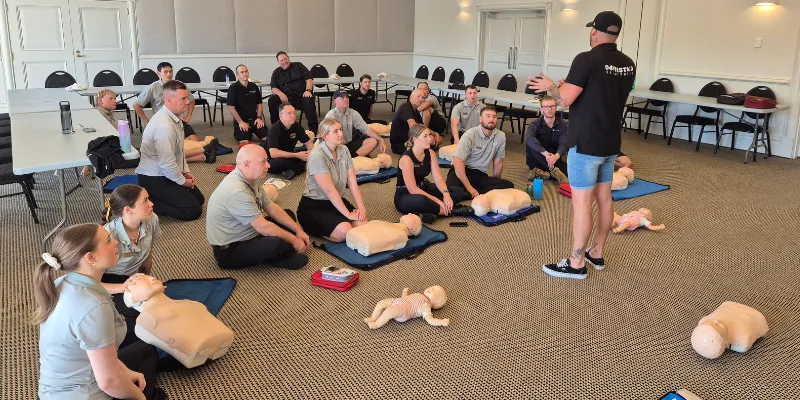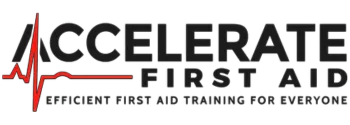
Which First Aid Course Do You Need for Childcare? A Complete Guide
Ask any experienced childcare worker about their most stressful day, and chances are they'll tell you about a time they had to use their first aid training. Maybe it was a child with a sudden allergic reaction, or a playground accident that needed quick thinking and calm hands.
I remember my first week working at a childcare center - a 4-year-old had a severe asthma attack during outdoor play. Having the right first aid training meant I knew exactly what to do, but I also know how scary it feels when you're not sure if your certifications are up to date or if you have the right qualifications.
Working with children means being ready for anything. But with different courses, changing requirements, and busy schedules, getting the right first aid certification can be confusing. You might be asking:
Which exact certification do I need for my role?
How often do I need to renew my qualifications?
Where can I find training that fits around my work hours?
As first aid trainers here on the Gold Coast, we've helped thousands of childcare workers just like you get the certifications they need. This guide breaks down everything you need to know about first aid courses for childcare - no complex jargon, just clear answers.
Understanding First Aid Requirements for Childcare
Let's start with what you actually need by law. Working in childcare isn't like other jobs - you can't just "figure it out as you go." Every childcare service needs staff with current first aid qualifications on site at all times.
Here's what the regulations say about first aid qualifications in childcare settings:
Basic Legal Requirements:
At least one staff member with current first aid qualifications must be on premises
All staff working directly with children need HLTAID012 certification
CPR qualifications must be updated every 12 months
Your first aid certificate needs renewal every 3 years
Different roles have different requirements too. Here's a simple breakdown:
Your workplace might have extra rules too. Some centers want all staff to have anaphylaxis and asthma training, even if it's not legally required. It's smart to check your center's specific policies.
Think of these requirements like a safety net - they're not just boxes to tick. When little Sophia had her allergic reaction last month at a local center, it was the educator's up-to-date anaphylaxis training that made the difference.
Essential First Aid Certifications Explained
Let's break down each certification you might need. No fancy language - just what each course covers and why you'd need it.
HLTAID012 (Provide First Aid in an Education and Care Setting)
This is your main certification for childcare work. It's built specifically for people working with kids, and covers:
Basic life support and CPR for different age groups
Common childhood injuries and illnesses
Allergy and anaphylaxis response
Asthma management
Head injuries and concussion
Seizures and epilepsy
CPR Certification (HLTAID009)
Even though CPR is part of your HLTAID012, you need to update it yearly. The course covers:
Latest CPR techniques for infants, children, and adults
Using an AED (defibrillator)
Basic airway management
Regular practice with mannequins
Mental Health First Aid for Youth Workers
While not always required, this qualification is getting more important. You'll learn:
Signs of mental health issues in children
How to respond to anxiety and panic attacks
Supporting children through trauma or stress
When and how to get professional help
Emergency First Aid Response
This extends your basic first aid skills with:
Complex emergency management
Multiple casualty incidents
Dealing with severe bleeding
Advanced wound care
Team response coordination

Getting Your First Aid Certification
Finding the right training isn't just about picking the first course you see online. Here's how to make it work for you, especially when you're juggling work and life.
Training Options That Fit Your Schedule
Gold Coast has several ways to complete your certification:
Weekend Courses
Full certification in 2 days
Perfect if you work weekday shifts
Usually runs 8am-4pm both days
After-Hours Classes
Evening sessions over 1-2 weeks
Great for morning shift workers
Typically 6pm-9pm weeknights
Blended Learning
Online theory + in-person practical
Do the book work when it suits you
One day of hands-on practice
What It Costs
Let's talk money - because training isn't cheap, but there are ways to manage it:
Money-Saving Tips:
Ask your center about training subsidies
Book with a group from your workplace
Look for early-bird discounts
Check if your tax agent can claim it as a deduction
Choosing a Training Provider
Here's what to look for:
Trainers with childcare experience
Flexible booking options
Free reassessment if needed
Modern equipment and facilities
Sarah, a childcare worker in Southport, told us: "I picked a provider that offered weekend courses. Spent my Saturday and Sunday there, but walked out fully certified and confident. Best part was practicing with real childcare equipment."
Maintaining Your First Aid Qualifications
Let's be real - keeping track of when your certificates expire is a pain. Here's how to stay on top of it without the stress.
Renewal Timeline Basics
Your certifications have different expiry dates:
CPR: Every 12 months
HLTAID012: Every 36 months
Asthma & Anaphylaxis: Every 36 months
Making Renewal Easy
Here's what experienced childcare workers do to stay current:
Keep digital copies of all certificates
Take photos of your cards as backup
Book renewal courses 2-3 months early
Update your center's compliance register
Save course receipts for tax time
Mixing Training with Work
You don't want to use all your time off for training. Try these tricks:
Team up with coworkers for group bookings
Rotate weekend shifts so everyone gets training time
Use student-free days for updates
Split online theory into smaller chunks
Book courses during quiet periods
Record Keeping That Works
Make a simple folder (physical or digital) with:
Current certificates
Course completion dates
Next renewal dates
Training provider contacts
Payment receipts
One Southport worker told us: "I keep everything in a folder on my phone. When my boss asks for updated certificates, I can send them right away. No more digging through old emails!"

Practical Applications in Childcare Settings
Let's talk about putting your training into real-life action. Because knowing what to do in theory is different from handling a real emergency with real kids.
Common Scenarios You'll Face
These are actual situations Gold Coast childcare workers deal with:
Playground Falls
Assessing head bumps
Checking for broken bones
Knowing when to call an ambulance
Keeping other children calm
Allergic Reactions
Spotting early warning signs
Using EpiPens correctly
Following action plans
Documenting the incident
Breathing Problems
Asthma attacks during play
Exercise-induced wheezing
Using spacers and inhalers
Monitoring recovery
Age-Specific Response Tips
Different ages need different approaches:
Babies (0-2 years)
Extra head support during CPR
Gentle back blows for choking
Temperature management
Safe positioning for recovery
Toddlers (2-3 years)
Staying calm when they're scared
Using simple, clear words
Making first aid less frightening
Getting cooperation during treatment
Preschoolers (3-5 years)
Explaining what you're doing
Using distraction techniques
Encouraging brave behavior
Teaching basic safety
A Gold Coast educator shared: "Last week a 4-year-old fell and cut his knee. I remembered my training - got down to his level, explained each step, and even turned the bandaging into a game. Made such a difference to how he handled it."
Taking the Next Step
Your first aid skills might be the most important thing you'll ever learn in childcare. No pressure, right? But here's the good thing - you don't have to figure it all out alone.
Quick Action Steps
Check your current certificates
Look at expiry dates
Compare with workplace requirements
Make a list of what you need
Plan your training
Choose between weekend or evening options
Look at blended learning if time's tight
Get quotes from local providers
Book Your Training
Call us: 0434778243 | 04FIRSTAID
Online booking available 24/7
Group bookings welcome
Plus, mention you're a childcare worker for special rates on complete certification packages.
Remember - every minute you spend training is an investment in keeping the children in your care safe. And isn't that why we got into this work in the first place?
Have any questions? Our team's here to help you find the right course for your needs.


